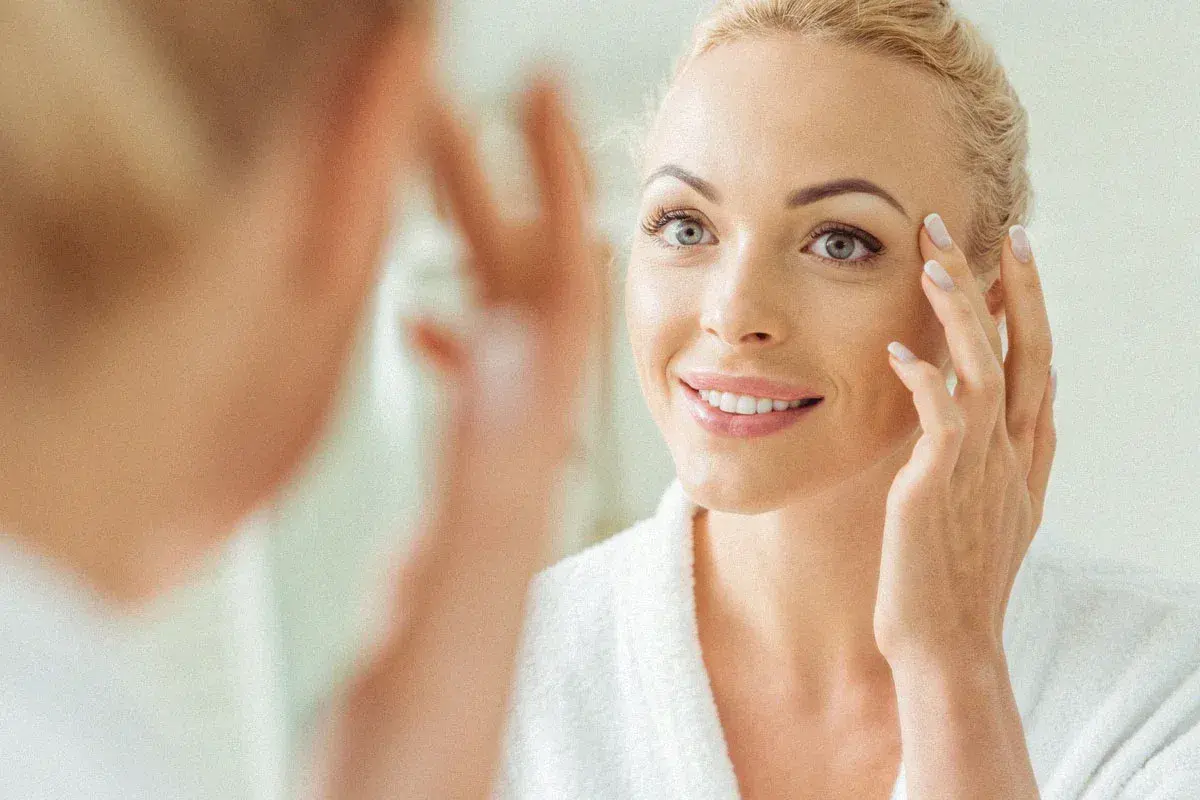If you think about it, beauty is more than an abstract concept—it’s the result of a series of lifestyle choices, factoring into how healthy you are on the inside and reflecting how you look on the outside. There’s nothing superficial about it; instead, scientific and anecdotal evidence suggests that the right combination of diet, exercise, and nutritional supplements contribute to the luster of the three major components of surface health: Hair, skin, and nails.
Article at a Glance
Skin & Nutrition
- Studies show that certain nutrients could lessen the effects of aging on your skin
- Collagen is especially powerful, as is vitamin E, vitamin C, zinc, copper, manganese, selenium, and vitamin A
- Some nutrients strengthen the skin’s natural defenses against photooxidation
Collagen For Skin Health
- Collagen is the most abundant protein the body
- Natural stores of collagen fade with time
- Collagen supplementation has been shown to improve skin
Antioxidants For Skin Health
- Antioxidants protect the skin from harmful free radicals
- Helpful antioxidants for the skin are found in resveratrol and green tea
- Antioxidants in vitamin E, vitamin C, and B-carotene also neutralize free radicals
Omega-3 Fatty Acid Skin Benefits
- The fatty acid eicosapentaenoic acid (EPA) is most helpful in skin health
- EPA regulates oil production in the skin, boosting hydration and preventing acne
- EPA can also protect collagen
Vitamins B12 and Biotin For Hair, Skin, Nails
- Vitamin B12 deficiency is linked to skin conditions
- Biotin shows promise in improving nail health
- A deficiency in Biotin could also contribute to hair loss
Hyaluronic Acid For Skin Health
- Hyaluronic acid (HA) is your body’s natural moisturizer
- HA can hold up to 1,000 times its weight in water
- The physical properties of HA also enable skin to retain elasticity
- Studies show HA is helpful in returning skin to its original, youthful form
As with all other components of health, there’s a specific collection of nutrients that contribute to the health and wellness of your hair, skin, and nails. And this isn’t a question of age or biological sex—all individuals should keep these physiological peripherals at the forefront of their health regimen, just as you would with heart, brain, vision, or joint health.
The Links Between Skin & Nutrition
For decades, scientific studies have been able to demonstrate a link between certain key nutrients, and the appearance, health, and elasticity of skin.
Scientific studies have suggested that certain nutrients like collagen may help lessen the effects of aging and improve overall skin appearance. Collagen specifically boasts properties that attract water molecules, improving skin hydration, purging free radicals, and reducing inflammation. Meanwhile, Vitamin E and Vitamin C are part of the skin’s natural defense system and are particularly important in protecting skin against harmful photooxidation damage caused to your skin by UV light.
Overall, vitamin C, zinc, and copper, along with vitamins A and E, manganese and selenium, also help to protect the skin against sun damage while assisting with collagen formation. Of all of those vitamins and minerals, vitamin C may be the most essential component in the biosynthesis of collagen, a process that prevents skin aging.
Collagen Is Essential For Skin Health
Collagen, the most abundant protein in your body, is the major element of connective tissues in several body parts including muscles, tendons, ligaments, and, yes, skin. Over the last decade, collagen supplements have become wildly popular in skincare efforts, and with good reason. Studies show that collagen peptides and supplements with collagen could potentially help to slow the skin aging process, reducing dryness and wrinkles.
Lauded for its ability to promote vibrant skin that shines with a healthy glow, collagen achieves this by providing a youthful elasticity. However, our natural stores of collagen tend to fade with time. This is where supplementation comes in.
A 2014 study gave a selection of women collagen supplements, while giving another set a placebo, resulting in skin improvements in about four weeks for the collagen group.
But it’s not just supplements. Several foods can help increase the body’s collagen production. Foods like bone broth, oysters, and dark leafy greens may help boost your Vitamin C, zinc, copper and protein levels, all which play a role in the biosynthesis of collagen.
Antioxidants Are Pro Skin Health
Meanwhile, antioxidants are essential for fighting pesky free radicals and ultraviolet radiation that damages skin. Antioxidant-rich extracts that may help protect the skin include resveratrol, green tea (EGCG), and other flavonoids and phenolic compounds.
But what are free radicals and what do they have against our skin? A free radical can be defined as any molecular species capable of independent existence that contains an unpaired electron in an atomic orbital. OK, but what does that mean? Basically, free radicals are born from normal metabolic processes in the body or from external sources such as exposure to X-rays, ozone, cigarette smoke, air pollutants, and industrial chemicals. And these free radicals roam around your body damaging cells and tissues—including those in your skin—by causing oxidative stress.
Antioxidants come along to help neutralize free radicals, inhibiting cellular damage. Although there are several enzymes within the body that scavenge free radicals, the principle vitamin antioxidants are vitamin E, vitamin C, and B-carotene. Your body cannot manufacture these micronutrients, so they must be supplied by food or nutritional supplements.
The Skin Benefits Of Fish Oil
Another soldier in the fight against skin damage is fish oil, which most people associate mainly with heart and brain health. The truth is, fish oil contains two types of Omega-3 fatty acids: docosahexaenoic acid (DHA) and eicosapentaenoic acid (EPA). In brain functionality, DHA is the hero. But for skin, it’s all about EPA, which benefits the skin by regulating oil production to boost hydration and prevent acne, while also staving off wrinkles and effectively delaying the skin’s aging process.
In 2005, the Journal of Lipid Research conducted a study which showed that EPA can help block ultraviolet enzymes that destroy collagen, thus helping to prevent wrinkles and sagging skin. Meanwhile, in what could be a breakthrough in the world of skin care, a recent study in the American Journal of Clinical Nutrition demonstrated that Omega-3 supplements could help prevent certain forms of dire skin conditions by blocking the sun’s ability to suppress our immune system.
Vitamins B12 And Biotin For Healthy Skin, Hair, & Nails
Vitamin B12 is an important cog in your body’s production of cells, making it key for healthy hair, skin, and nails. And in cases of a vitamin B12 deficiency, complications in these areas become apparent.
Studies show that below average levels of vitamin B12 are linked to skin conditions, along with physical blemishes like nail discoloration, hair thinning, and changes to skin pigmentation. What’s more, studies demonstrate that if you have a skin condition that doesn’t respond to conventional therapy, it could be a sign that you have a vitamin B12 deficiency. Coupled with that, another study displays results showing that skin discoloration was cleared up after supplementation with vitamin B12.
Biotin, meanwhile, demonstrates the most promise in benefiting brittle and thin nails. A study showed that treatment with biotin (also known as vitamin B7) resulted in a definite improvement with firmer and harder fingernails after less than three months. Other studies back up the notion that biotin can help strengthen nails. In one study, 67 percent of test subjects demonstrated a 25 percent increase in overall nail thickness; in another study, participants showed similar results on brittle nails.
Meanwhile, there’s some evidence that a deficiency in biotin could potentially contribute to hair loss.
The Skin Benefits Of Hyaluronic Acid
Hyaluronic acid (HA) serves a variety of roles in your body, with one of the more famous being its ability as a natural skin moisturizer, lending elasticity and flexibility, while helping you retain precious collagen. HA can hold up to 1,000 times its weight in water, which gives the substance its magnificent ability to moisturize.
Then there’s HA’s viscoelasticity, a physical property that enables skin to regain its original form after its been stretched or pinched. Roughly half of the hyaluronic acid in your body is present in your skin, where it binds with water to help retain moisture. Studies demonstrated a significant moisturizing effect using different forms of HA—including cream, serum, and lotion. The study showed that after two, four, and eight weeks of treatment, the skin of participants was significantly more hydrated than untreated skin. Additionally, a marked improvement of skin elasticity was also observed.
From Surface Beauty To Inner Health
Keeping your skin free of wrinkles and lines, while maintaining firm fingernails and lush hair, isn’t merely about looking pretty or youthful. It is about maintaining a healthy glow that, yes, looks great, but is also a sign of full-body vitality as well as overall self-confidence that may benefit the mind, body, and soul









